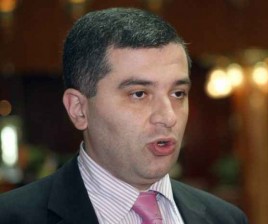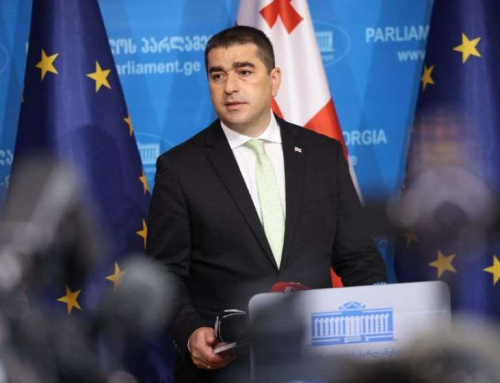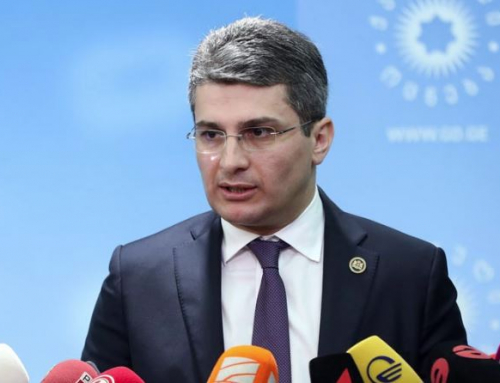
The National Movement’s parliamentary leader Davit Bakradze. (Interpressnews.)
TBILISI, DFWatch–The National Movement party went on the offensive on Sunday and demanded an investigation into claims that the Prosecutor’s Office pressured two judges in a corruption case against Tbilisi Mayor Gigi Ugulava.
Ugulava was Saturday night suspended from his position as mayor pending the trial. The decision by the City Court was justified out of concern that if he continues as mayor, it will hamper the investigation.
The Prosecutor’s Office has charged Ugulava with embezzling 50 million lari (USD 30 million) of City Hall money and using it to finance the UNM’s 2012 election campaign. The court set a 50 000 lari (USD 30 000) bail and later suspended his status as mayor.
Ugulava and his party claim that this decision was made as a result of pressure from the Prosecutor’s Office and Sunday demanded to have a commission to investigate the claim as well as other measures to halt what they see as politicized justice. The other four demands were laid out by parliamentary leader Davit Bakradze.
The party wants another commission to investigate a statement made by former Interior Minister Vano Merabishvili that he was brought out from his cell and threatened.
Merabishvili said that he was secretly taken out from prison possibly to the prison department, where the Chief Prosecutor met him and asked him to give false testimony about ongoing cases with high public interest. Merabishvili also claims the prosecutor threatened his friends and relatives.
After he said this, his own lawyers and UNM members asked to have the footage from the prison surveillance camera published in order to see whether Merabishvili was really taken out from his cell or not, but the government refused.
Another UNM demand is to hold sessions of the parliamentary committee on human rights and the judiciary committee to discuss the Ugulava case and the Merabishvili case.
The party also demands that Ombudsman Ucha Naunashvili comes to parliament to inform assembly members of what happened when he visited Merabishvili in prison. UNM also demands that the Chief Prosecutor’s Office comes to parliament to meet with the opposition and answer questions regarding Merabishvili and other issues.
Meanwhile, a handful of the most influential non-governmental organizations (NGOs) in Tbilisi published a statement that calls on the chairman of Tbilisi City Court to probe the Ugulava case to find out whether there was any improper communication with the judge. In the years when the UNM was in power, observers criticized the courts for having direct contact with prosecutors – sometimes by phone – that influenced their decisions.
After the UNM lost power in 2012, this has become less of a problem in Georgia, but the situation is rather fragile and unstable, the groups write. There have been a number of attempts by law enforcement agencies to pressure the judicial system, thus impacting the degree of justice and trends of the system’s development, they write.
But the NGOs also urge ‘all political parties’ – a phrase undoubtedly meant for Ugulava – to not make political statements that may influence a judge. “Releasing false and inaccurate statements will clearly have a negative impact on the course of judicial proceedings,” the statement warns. It is signed by Georgian Young Lawyers’ Association, International Society for Fair Elections and Democracy (ISFED), Transparency International – Georgia, Georgian Democratic Initiative (GDI), Human Rights Education and Monitoring Center (EMC), Georgian Bar Association, Article 42 of the Constitution.
The US ambassador to Georgia expressed concern with the suspension of Ugulava. “We share the concerns of civil society about the suspension of an elected official and are following these developments closely,” Richard Norland wrote. “We renew our call on the authorities to scrupulously and transparently observe due process and the rule of law.”





Leave A Comment
You must be logged in to post a comment.